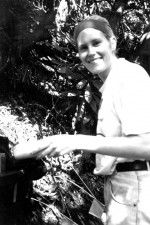Bryan Dail and I are graduate students at the University of Georgia working at the Coweeta LTER. This study is an extension of our work being conducted at Coweeta, performing the same soil analyses that we had been conducting at Coweeta (microbial biomass carbon, nematode trophic groups, percent organic matter, soil C and N, soil phosphorus fractionation and soil sulfur etc.) across a transect including Hubbard Brook, Harvard Forest, and Coweeta. We believed it would be interesting to compare these soil factors across three northern, temperate hardwood forest sites and see what differences there were and what might be the factors behind these differences.
We contacted the site managers at Hubbard Brook and Harvard Forest to discuss our proposal, the analyses we would perform, where we wanted to sample, and the amount of soil we would need to collect to perform these analyses. In this way we obtained permission to sample these sites. Along with permission to sample we also determined a budget to cover travel, food and housing for the sampling trip, plus estimated costs for performing the various analyses indicated in our proposal.
Ultimately we were funded by Harvard Forest as offered by David Foster. Once we received funding we were able to set sampling dates by talking with the site managers regarding ongoing projects on site. We were able to stay at the Harvard Forest facilities and all travel, room, and board was paid for through reimbursement.
For myself, this project has resulted in a presentation at ESA, Baltimore 1998, and I am currently writing up my portion of the project for publication. This experience also helped give me a better understanding of the various types of research being conducted across these sites and allowed me insight into how the environmental factors and site histories have led to the different focal points involved in the research projects of today.
For future intersite projects I think it is important that cross-site comparisons span more than one sampling date. While I believe there is validity in conducting a cross-site comparison which is more descriptive in nature (such as our work on this project), a longer-term cross-site project would allow the researcher to ask definitive ecological questions about the biotic or abiotic ecosystem level factors that lead to the results they discover.
Such studies would foster publishing in this area of research and would develop and strengthen interaction between students and PIs across the LTER sites.
Graduate Students Conduct Cross-site Study: Comparing Soil Factors Across Three Hardwood Temperate Forests
By:
Christins Wright (CWT) 
 Enlarge this image
Enlarge this image